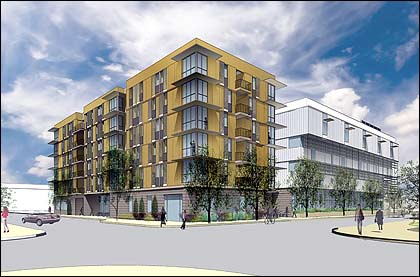Digs: EW’s guide to green homes & gardens
Farms Not Lawns Defense against divisions in your own back 40
Low VOCs for My Undies Refinishing furniture the low-toxic way
Green Digs LCC offers low-carbon, car free living downtown
Green on Top Great for the environment, wallet, health and wellbeing
Where To Find Used Home & Garden Materials
Green Digs
LCC offers low-carbon, car free living downtown
By Alan Pittman
Construction begins this month on some of the greenest housing digs ever built in Eugene ‹ LCCs downtown apartment building for 250 students.
 |
øSustainability is one of the colleges core values,” said LCC spokesman Brett Rowlett. The housing is part of LCCs $53-million downtown campus project in the Sears pit across from the downtown library.
Instead of sticking spades into some green farm field on the sprawling edge of town served by an expensive freeway, officials last Friday øbroke ground” by slinging dirt into the pit. The LCC project will recycle the enduring eyesore into model green density offering car-free, low-carbon, low-cost living and a much-needed redevelopment spark to the heart of the city.
The five-story, 87,000 sq. ft. apartment building will serve students with a mix of single, double and quadruple apartments as well as studios. The buildings ground floor will have a campus store and meeting rooms.
The buildings carbon footprint per resident likely will be far less than even the greenest low energy homes built in Eugene. Apartments, with their shared walls and floors, share heating and cooling. They also share infrastructure, greatly reducing the embodied energy carbon impact of building materials.û
In addition, LCC plans a LEED Gold certified building with some of the latest insulation, appliances and lighting techniques for reducing power.û
But since hydropower provides electricity for most buildings in Eugene, the buildings greatest carbon reduction benefit may be simply its downtown location.û
Students going to classes downtown or to LCCs business services office will have to walk mere steps to the adjacent 90,000 sq. ft. LEED Platinum academic center. To get to LCCs main campus, students can cross the street to LTDs main transit hub for frequent buses running to the campus in just 17 minutes. The LTD bus station also offers express EmX routes to the UO, downtown Springfield, RiverBend hospital and Gateway Mall as well as a future EmX route planned for West Eugene, and other direct bus connections to destinations all over town.
Just a few more steps away is downtown Eugene ‹ offering one of the nations best city libraries, restaurants, bars, music clubs, Kiva grocery, the Hult Center, coffee shops and bakeries and the largest concentration of jobs in the region.
The student housing will also include significant bike parking. City code for bike parking requires one bike parking space for each two residents in a dormitory.û
In perhaps its greenest element, the apartment building will not include a parking garage for cars. Not including car parking in a building can save up to $50,000 per space in construction costs, substantially reducing rents.û
Eugenes underutilized downtown parking garages can provide spaces for students with cars.
LCCs Rowlett doesnt expect LCC will have trouble filling the green housing. He said a housing market study found high demand for student apartments downtown. øThere was a definite need,” he said.û
Rowlett said the housing will go first to LCC students and then to UO students if space is available. Rowlett said he expects residents will reflect LCCs diverse group of students, including many older, returning students and some international students.
The community college creatively cobbled together financing for the building from a variety of sources including $9 million in voter approved LCC bonds, $8 million in urban-renewal funding from the city and $5 million in tax credits, with the remainder coming from a combination of other federal tax credits, energy tax credits, bond sales and grants.
LCC plans to fast-track construction on the green downtown housing with completion by fall 2012 and doors opening January 2013.